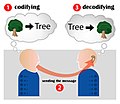Nick Morgan
Nick Morgan | |
|---|---|
 Nick Morgan in 2012 | |
| Born | 1953 |
| Alma mater | University of Virginia Princeton University |
| Occupation(s) | Speaking coach, author |
| Children | Emma Wyatt, Sarah Morgan, Eric Morgan, Howard Morgan |
| Website | publicwords |
Nick Morgan (born Nicholas H. Morgan in 1953)[1]: 2 is an American speaking coach and author.[2][3]
Morgan received his A.B. in English from Princeton University in 1976 after completing a 140-page long senior thesis titled "The Artistry of Form: Dickens' Great Expectations and Our Mutual Friend."[4] He earned his M.A. and Ph.D. in English literature and rhetoric at the University of Virginia in 1977 and 1981, respectively. He taught Shakespeare and Public Speaking at the University of Virginia and Princeton University. At University of Virginia, he also served as Assistant Vice President and Provost. He first started writing speeches for Virginia Governor Charles S. Robb and went on to found his own communications consulting organization, Public Words, in 1997.[5][6]: 229
Individual clients include former
He has written hundreds of articles for local and national publications, including Forbes.[9][10] Harvard Business Review cited his article How to Become an Authentic Speaker as one of ten "must read" articles on communication.[11]
Morgan is an expert in non-verbal communications skills for public speakers, and has coached and written extensively on this topic.[12] His interest in body language was particularly fueled by three life events at age 17: "First, I read a book about the Dalai Lama ... Second, I learned my father was gay. And third, I died."[13][14][15]
His expertise encompasses not only traditional in-person meetings and presentations,[16][17] but also the increasingly common virtual-world meetings using teleconferencing.[18]
He is frequently asked to critique speeches by celebrities such as the campaign speeches of
As well as leading Public Words, he served as editor of the Harvard Management Communication Letter from 1998 to 2003.[22] Morgan is a former Fellow at the Center for Public Leadership at Harvard’s Kennedy School of Government.[5]
Publications
Morgan authored books for
More recently he has published with
In 2012, two expert public speakers (Bruce Gabrielle and Gonzalo Alvarez) interviewed five of their colleagues on the question "What do the top presentation experts in the world read?" Of 35 books shortlisted, Morgan's book Give Your Speech, Change the World came 1st in the "Delivery" category, 2nd in the "Content" category, and 4th overall.[33]
Morgans most recent book, Can You Hear Me?: How to Connect with People in a Virtual World (2018)[34] is a Washington Post Non-Fiction Best Seller.[35]
Harvard Business Review Press published Morgan's book Power Cues: The Subtle Science of Leading Groups, Persuading Others, and Maximizing Your Personal Impact on May 13, 2014.[36][37]
Morgan is also the author of a book on Charles Dickens,[1] a screenplay, and five theatrical plays.[6]: 229
In addition, he occasionally comments on the state of the publishing industry and its transition from print to the digital era.[38]
Notes
- ^ ISBN 978-0-8386-3447-9. Retrieved 26 February 2013.
- ^ "Nick Morgan, Communications Expert". Speakers' Spotlight. Retrieved February 24, 2013.
- ^ "Nick Morgan: Profile". Speakers' Platform. Retrieved February 24, 2013.
- ^ Morgan, Nicholas Heath (1976). "The Artistry of Form: Dickens' Great Expectations and Our Mutual Friend".
{{cite journal}}: Cite journal requires|journal=(help) - ^ a b "Nick Morgan". Public Words. Retrieved February 24, 2013.
- ^ ISBN 978-1-59139-714-4. Retrieved December 25, 2012.
- ^ "People We've Worked With". Public Words. Retrieved February 24, 2013.
- ^ Scott, David Meerman (November 10, 2011). "You need honest feedback. You need a coach". Web Ink Now. Retrieved February 24, 2013.
- ^ Morgan, Nick (2012-09-25). "What Do Harvard Business Publishing and Harlequin Have in Common?". Forbes. Retrieved February 24, 2013.
- ^ Morgan, Nick (2011-08-15). "Becoming a Passionate Communicator". Forbes. Retrieved February 24, 2013.
- ^ "HBR's 10 Must Reads on Communication". Harvard Business Review. Archived from the original on 2013-02-09. (Another version)
- ^ Morgan, Nick (2012-10-25). "7 Surprising Truths about Body Language". Forbes. Retrieved February 25, 2013.
- ^ Morgan, Nick (February 8, 2013). "How to Think About Body Language". Forbes. Retrieved February 25, 2013.
- ^ Morgan, Nick (February 12, 2013). "How to Think About Body Language - part 2". Forbes. Retrieved February 28, 2013.
- ^ Morgan, Nick (February 14, 2013). "How to Think About Body Language - part 3". Forbes. Retrieved February 28, 2013.
- ^ Purdue, Jane (July 30, 2010). "Build your credibility, trust". The Post and Courier, Charleston, South Carolina. Retrieved February 24, 2013.
- ^ Levinson, Meridith (May 21, 2010). "Leadership, Communication and Authenticity". CIO Magazine. Archived from the original on April 7, 2013. Retrieved February 24, 2013.
- ^ Schachter, Harvey (November 4, 2012). "Real-world tips for virtual-world meetings". The Globe and Mail. Retrieved 26 December 2012.
- ^ Welch, Matt (19 March 2010). "The Obama "narrative" narrative". Australian Broadcasting Company. Retrieved February 24, 2013.
- ^ Hechinger, Paul (March 23, 2012). "Royal Roundup: The Duchess's Speech". BBC. Retrieved February 24, 2013.
- ^ "Public Words: Buzz". Public Words. Archived from the original on February 15, 2013. Retrieved February 24, 2013.
- ^ "Search results for Nick Morgan". Harvard Business Review. Retrieved February 24, 2013.
- ISBN 978-1-57851-986-6. Retrieved 25 December 2012.
- ISBN 978-1-57851-819-7. Retrieved 25 December 2012.
- ^ "Non fiction review: Working the Room: How to Move People to Action Through Audience-Centered Speaking". Publishers Weekly. Reed Business Information, Inc. April 1, 2003. Retrieved March 4, 2013.
- ISBN 978-0-470-40435-5. Retrieved 25 December 2012.
- ISBN 978-1-936529-50-6. Retrieved 25 December 2012.
- ISBN 978-1-61230-106-8. Retrieved 25 December 2012.
- ISBN 978-1-61230-019-1. Retrieved 25 December 2012.
- ISBN 978-1-61230-009-2. Retrieved 25 December 2012.
- ISBN 978-1-61230-164-8. Retrieved 25 December 2012.
- ^ Frye, Curtis (February 20, 2009). "Review: Trust Me: Four Steps to Authenticity and Charisma". Technology and Society Book Reviews. Retrieved March 4, 2013.
- ^ Gabrielle, Bruce; Alvarez, Gonzalo (October 8, 2012). "The Top 35 Books on Presentation". Retrieved February 24, 2013.
- OCLC 1030761119.)
{{cite book}}: CS1 maint: location missing publisher (link) CS1 maint: multiple names: authors list (link) CS1 maint: numeric names: authors list (link - ^ "Washington bestsellers: Hardcover nonfiction". Washington Post. Retrieved 2019-04-08.
- ^ Power Cues: The Subtle Science of Leading Groups, Persuading Others, and Maximizing Your Personal Impact
- ISBN 978-1-4221-9350-1.
- ^ Webb, Jenn (Jul 27, 2012). "Putting a Price on Value: The ToC Perspective". Publishers Weekly. Reed Business Information, Inc. Retrieved March 4, 2013.
External links
- Nick Morgan's channel on YouTube

